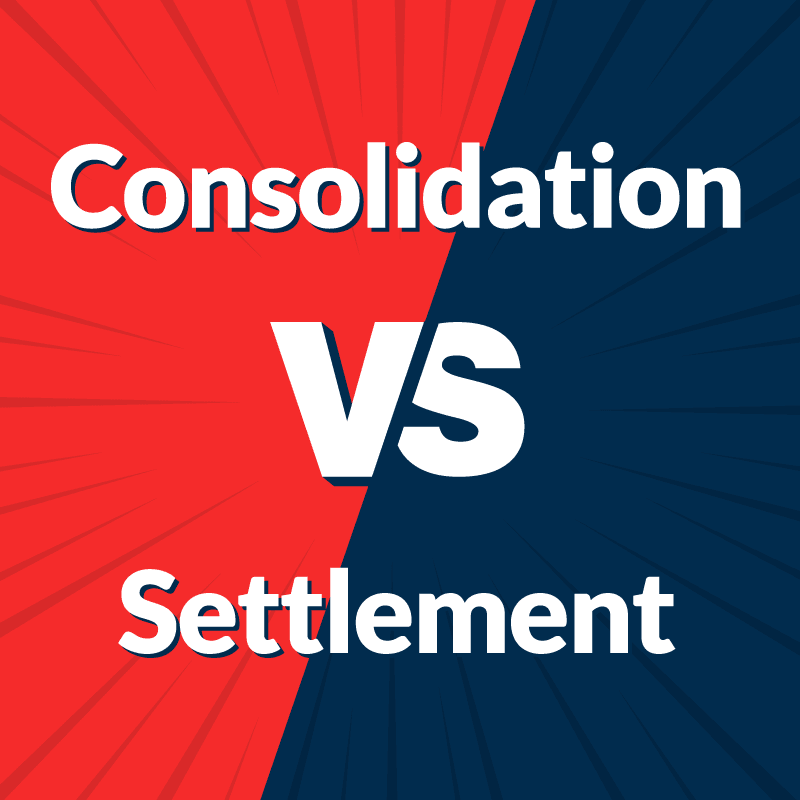Should You Choose Debt Consolidation or Debt?
Home » Credit Card Debt »
If your debt has reached a crisis point where you you’re paying what you can afford to pay, but not making progress reducing the debt, you’re right to be concerned.
You’ve likely heard of two solutions — debt consolidation or Debt — and you may think they’re interchangeable terms. They’re not.
Debt consolidation and Debt are strategies for making debt manageable, but they are different methods and bring different results. Debt consolidation reduces the number of creditors you’ll owe. Debt tries to reduce the amount of debt you owe.
The latter may sound preferable to the former, but it’s not that simple.
What Is Debt Consolidation?
Debt consolidation combines multiple debts into a single payment. The four common ways to approach this are:
- Debt management. A nonprofit credit counseling agency works with your credit card companies to reduce the interest rate charged and arrive at an affordable monthly payment that eliminates the debt in 3-5 years.
- Zero-percent balance transfer. Transferring the balance on your credit cards to one that charges 0% interest. These usually are available only to consumers with credit scores above 680 and can involve a transfer fee of 2-3% of the balance being transferred. The 0% interest rate usually lasts 12 to 18 months, so you need to be disciplined about paying down the debt. You will need to look into debt consolidation options for bad credit if you have trouble qualifying.
- Personal loans. Banks, credit unions and online debt consolidation lending companies offer personal loans, at fixed rates that are lower than that offered by credit cards. These loans also include an origination fee and can require collateral such as your home or car to secure the loan.
- Home equity lines of credit (HELOCs) and home equity loans also carry relatively low interest rates, but your home serves as collateral and could be lost if you fail to make payments. Application fees and closing costs also could be involved.
Advantages of Debt Consolidation
Debt consolidation can make your life easier and, possibly, less expensive. Simply having one payment to keep track of instead of several can be worth consolidating for some borrowers. A bigger benefit is a lower interest rate on the debt management program or consolidation loan, means you pay less than if you try to pay off high-interest credit cards.
If you make on-time payments, debt consolidation will lower your credit score briefly, but the score will come back and actually be higher by the time you finish paying off the debt.
Disadvantages of Debt Consolidation
Debt consolidation is not a magic bullet. Reducing the monthly payments through consolidation can tempt you to take on more debt, but that’s what got you in trouble in the first place. If you don’t increase your payments and control your spending, the problem will continue. Also, consolidation loans may extend the payment period, which means it might take longer to pay off the debt and you will pay more interest over the life of the loan.
» More About: Advantages and Disadvantages of Debt Consolidation
What Is Debt?
Rather than replace debt with a new loan, Debt is a negotiation to get creditors to settle for less than what you owe, usually as a lump-sum payment. Most often, this involves a large debt to one creditor, but can be used to deal with multiple creditors.
Understand going in: Creditors aren’t obligated to negotiate or accept a Debt offer. But, if a creditor thinks your offer is the best chance to get at least some of the debt paid, a settlement is a possibility. Debt collection can be expensive and dealing with a bankruptcy proceeding has its drawbacks.
Advantages of Debt
The advantages sound almost too good to be true. The settled debt is gone, often for far less money than you actually owed.
Disadvantages of Debt
It should come as no surprise that Debt does really, really bad things to your credit score, knocking anywhere from 75-150 points off it. How could it not? Future loans – if you can get them – will come with high interest rates.
Then, there are fees. Assuming you aren’t making payments to creditors while you negotiate a settlement, the late fees, interest and penalties continue, adding to what you already owe. Debts don’t happen overnight; 2-3 years is a normal time, which is a lot of late fees and penalties. Also, Debt companies charge a fee to negotiate for you, typically 20-25% of the final settlement.
Finally, the IRS may consider the amount of forgiven debt to be income, on which you will pay taxes.
Which Option Should You Choose?
Consolidation vs. settlement: If your debt is manageable a debt consolidation program can simplify and reduce your monthly payments so you can pay your debt off sooner.
Settlement is the near-nuclear option, a half-step from bankruptcy. Your debt has spiraled to a point where you can’t see a way to get on top of it, and you’ve missed enough payments – or collection agencies already are calling you – so that your credit score already has taken a big hit. You don’t have much to lose.
If you’re considering any of these options, the good news is that you’re trying to take care of a problem rather than just hoping it goes away. Look carefully at your circumstances so you can make a decision that puts you on a path to a financially sound future.
Sources:
- (2018, September 21). What's the difference between debt consolidation and Debt? Retrieved from https://www.investopedia.com/ask/answers/110614/whats-difference-between-debt-consolidation-and-debt-settlement.asp
- NA, ND. Debt vs Debt Consolidation: Which credit card Debt option is right for your credit and financial situation? Retrieved from https://www.consolidatedcredit.org/debt-solutions/debt-settlement-vs-debt-consolidation/#gref
- Fay, B., ND. Debt vs. Debt Consolidation. Retrieved from https://www.debt.org/settlement/vs-consolidation/
- NA, ND. Debt Consolidation vs. Debt vs. Debt Management Program. Retrieved from https://www.nfcc.org/blog/debt-consolidation-vs-debt-settlement-vs-debt-management-program/
- Pyles, S. (2019, February 19). Debt Consolidation vs. Debt: Which is Better? Retrieved from https://www.nerdwallet.com/blog/finance/debt-consolidation-debt-settlement/

